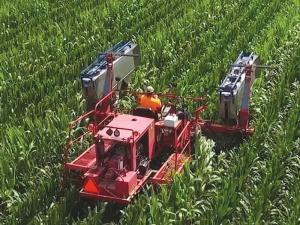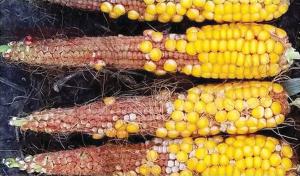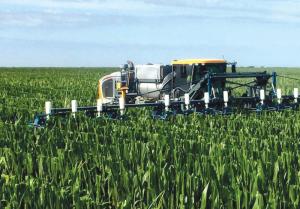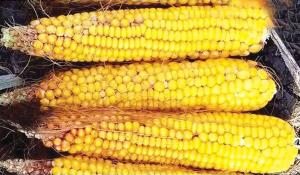2020 - Volume #44, Issue #3, Page #27
[ Sample Stories From This Issue | List of All Stories In This Issue | Print this story
| Read this issue]
Custom Pollination Used To Boost Row Crop Yields
 |
 |
 |
 |
“We have developed an efficient process to collect and then deliver corn pollen on demand,” says Jason Cope, PowerPollen co-founder. “Corn pollen typically dies within 30 min. of being shed. We collect and then refrigerate it, preserving mass amounts of pollen until the female corn plants are ready to be fertilized.”
Currently PowerPollen services are targeted at seed corn producers and the companies they grow for. However, the company plans to bring their products to commodity producers in the near future.
“We hope to make our services available to commercial corn producers in the next 3 to 5 years,” says Cope.
The goal is to reduce the potential impacts of heat, wind and rain on crop pollination, all of which can reduce yield significantly. Likewise, any delay between the male’s optimum pollen release date and the female’s optimum silk receptivity can reduce kernel formation.
Benefits for seed corn producers include planting entire fields to the desired female line instead of a mix of male and female. This increases the yield per acre of the final cross. Precisely timed pollination increases yield per plant.
“Controlled pollination also allows crossing lines, even if both lines don’t naturally pollinate at the same time,” says Cope. “Seed companies now have the opportunity to introduce new hybrids by taking lines that previously couldn’t cross pollinate.”
Cope describes the ability to introduce male dominant traits carried through pollen, such as insect resistance, drought tolerance or oil content. “We can even make adjustments during season, depending on field conditions or the marketplace,” he says.
Cope points to the current problems with ethanol production as an opportunity to adjust on the fly. While a producer might have planned to apply pollen that added value to the ethanol process, they could substitute different pollen. It might add value to another process or simply be higher yielding.
“If the area entered a long-term drought period, the preferred pollen might be more drought tolerant,” says Cope. “Our process gives seed companies and their growers greater control and flexibility.”
Cope, an engineer, and his geneticist co-founder Todd Krone, started PowerPollen out of a garage after brainstorming ways to reduce production risks and pitfalls.
“We are using a licensing approach with our patented pollen protection system,” says Cope. “We will share in their increased profitability per unit of ground. While we are still working on a formula for servicing farmers, I can’t imagine it would be much different.”
Contact: FARM SHOW Followup, PowerPollen LLC, 2302 SE Creekview, Suite 6, Ankeny, Iowa 50021 (ph 515 262-5502; info@powerpollen.com; www.powerpollen.com).

Click here to download page story appeared in.

Click here to read entire issue
To read the rest of this story, download this issue below or click here to register with your account number.




